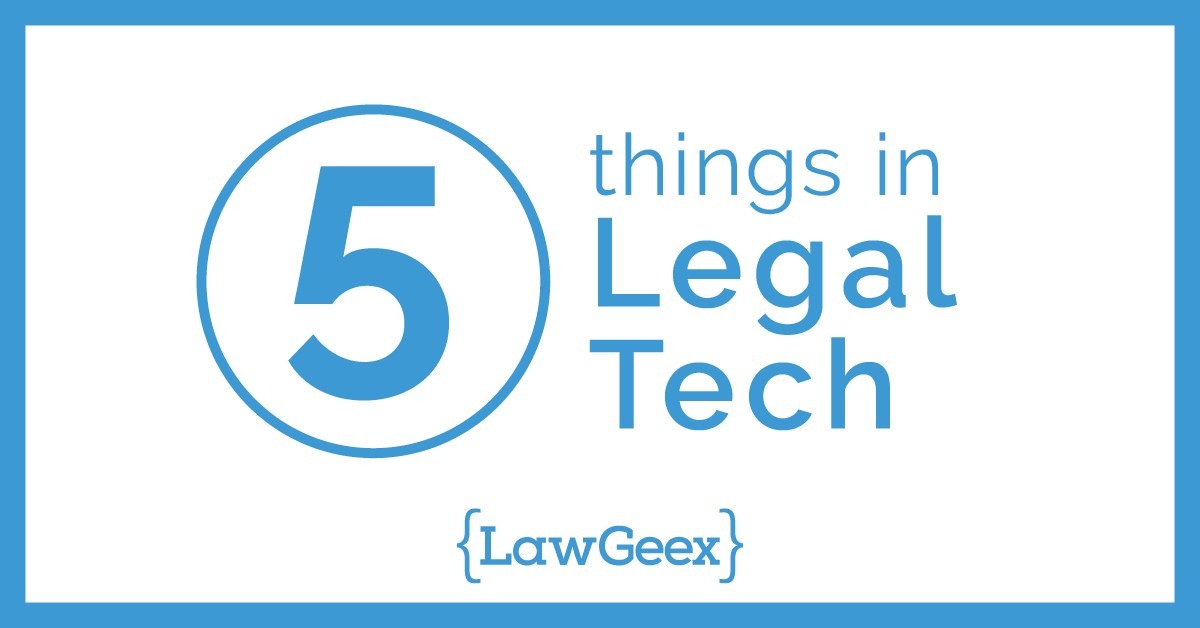Your time is short. This quick read gives you 5 things you need to know from LegalTech in the past seven days.
1
Fantastic Law Firm Incubators and where to find them
In Legaltech News, Ian Lopez provides the ultimate cheat sheet. He reveals which law firms run which tech incubators or software. Here is the rundown: Crowell & Moring (Digital Transformation Group); Dentons (Nextlaw Labs); Drinker Biddle & Reath (Tritura Information Governance (eDiscovery)); Jackson Lewis (Workthruit (workplace laws tech software)); Littler Mendelsohn (CaseSmart (employment)); Perkins Coie (patent prosecution management); Reed Smith (GravityStack); Winston & Strawn (full service ediscovery vendor); Akerman; (Akerman Data Law Center); Allen & Overy (Fuse); Atrium LLP (Atrium LTS); BakerHostetler (Accord Project); Cravath, Swaine & Moore (Luminance (partnership)); Slaughter & May (stake in Luminance and Accord Project).
2
Product Launch of the Week
Legal research pioneer, Casetext, updated and integrated their in-house AI, called CARA (Case Analysis Research Assistant). The reviews among early testers were positive. Jean P. O’Grady in Dewey B Strategic asked, “Did Casetex just ‘Drop Kick’ Keywords out of the legal research process?” She writes that the biggest move forward is that “CARA AI can analyze litigation documents which are completely lacking in citations.” Legaltech blogger, Robert Ambrogi, concurred: “The CARA AI-assisted research tool strikes me as a major advance in legal research.” In Legaltech News, Casetext CEO Jake Heller says the tool is “now objectively the fastest of all legal research applications.” In O’Grady’s words, while the company provided no data to back this up “I have to agree CARA AI is lightning fast.”
Hear from CEO @Jacob_Heller on our new release of @casetext and find out why we believe this is the future of #legalresearch #AI Watch Now>> pic.twitter.com/Hy68eAxald
— Casetext, Part of Thomson Reuters (@casetext) May 2, 2018
3
The first thing we will do: ban the term “non-lawyers”
https://twitter.com/marktgreene/status/991039166220783616
No more “non-lawyer” trash talk. That was the message from The Summit on Law and Innovation (SoLI) at Vanderbilt Law School in Nashville which focused on collaboration and innovation in the legal profession. It highlighted the need for “cognitive diversity”. Larry Bridgesmith, one of the organizers, pointed out that you don’t hear people referring to non-plumbers or non-accountants or non-engineers, so he implored panelists to stop using the term “non-lawyers.”
David Hudson of the ABA Journal writes, “Law schools and lawyers must change the way they operate in a brave new world driven by data, technological change, and process management…. There must be a collaboration between lawyers and those in other fields”.
4.
Law School Innovation
More from the Summit on Law and Innovation (SoLI). Chris Guthrie, dean of Vanderbilt Law School, discussed the lack of innovation at law schools and what law schools should teach. This theme was taken up by Ken Grady, himself an adjunct professor, who said, “failure to teach law students basic tech skills and then sending them off to solo to smaller law firms, which also lack basic skills, perpetuates a tech-ignorant profession.” But he stops short of suggesting every lawyer should code: “there will be some law students who decide a career involving coding and building applications to legal services is preferable to practicing law. But, law schools should not be the places teaching coding.”
5.
Studies you Need to Know
The second annual study of Legal Spend Management from The Blickstein Group and Exterro was released. The conclusion: almost the same number of legal departments are increasing their outside legal spend as those that are decreasing it. Joe Patrice of Above the Law sees one takeaway: “it’s that clients crave predictability to an arguably irrational extent. They know what a full-time employee costs. They don’t know how many hours you’ll bill. Clients will choose the former more often than not.” This week we also discovered that women and people of color are significantly underrepresented among legal tech founders, accounting for just 13.6 percent and 26.5 percent, respectively. Plus legal employment ticked up in April, adding 800 jobs in a month that saw total unemployment in the U.S. drop to a level not seen in nearly two decades.
The Blurb: A curated mix of articles worth sharing in the past week.
No more Stranger Things: 2018 Tech lawyers need to know
Chicago next stop for Tech Masters Summit
From Other Sites
Eric Fiszelson: Spider-man and the legal industry
LeftFoot Podcast with Lisa Konie Senior Director, Legal Operations at Adobe
PwC Announces Legal AI Partnership with eBrevia for Doc Review
Pre-order for free the 2018 edition of the In-House Counsel’s LegalTech Buyer’s Guide
The highly-anticipated In-House Counsel’s LegalTech Buyer’s Guide 2018 will launch this May. Ensure you get your copy first in your inbox as soon as it launches. The guide is relied upon by the world’s leading law departments in their tech buying decisions — and has been described by leading General Counsel as the “bible” for all in-house legal teams. The fully updated and revised guide for 2018 includes more categories, more vendors and more first-hand accounts of legal buying journeys. It now tackles 16 major areas of pain for in-house lawyers and legal departments, from contract drafting to legal research, communications, matter management, e-discovery, and digital signature platforms.
It includes a deep-dive based on legal departments at companies including Facebook, Google, Twitter, AIG, McDonald’s, Microsoft, NetApp, and many more. It includes expertise from leading legal experts including Sterling Miller, Vicky Lockie, Lucy Bassli, Richard Tromans, Caroline Hill, Mary Redzic, Nilema Bhakta-Jones, Casey Flaherty, Caroline Hill, and Michael Mills,
The Buyer’s Guide is a free, downloadable guide that showcases 120+ must-know technology solutions which solve the daily challenges faced by in-house lawyers.


